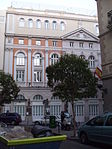Café de las Salesas
Buildings and structures in Centro District, MadridBuildings and structures in Justicia neighborhood, MadridBuildings and structures in MadridFormer buildings and structures in Madrid
The Café de las Salesas (1878–1945) was an establishment in Madrid located on Calle de las Salesas street, and later at number 17 of Calle del Conde de Xiquena street and the corner of Plaza de las Salesas square. It was a classic 19th-century café with large mirrors on the walls that made it seem more spacious, marble tables and wooden chairs, large maroon booths, metal columns under crystal chandeliers, and a ringer telephone. For a while, it was also a café-chantant venue and had a billiard room as well.
Excerpt from the Wikipedia article Café de las Salesas (License: CC BY-SA 3.0, Authors).Café de las Salesas
Calle del Conde de Xiquena, Madrid
Geographical coordinates (GPS) Address Nearby Places Show on map
Geographical coordinates (GPS)
| Latitude | Longitude |
|---|---|
| N 40.423711111111 ° | E -3.694025 ° |
Address
Carolina Herrera
Calle del Conde de Xiquena
28004 Madrid (Centro)
Community of Madrid, Spain
Open on Google Maps










